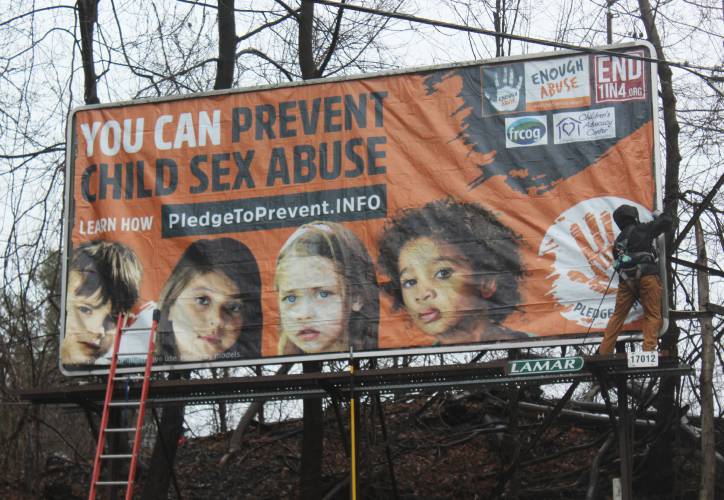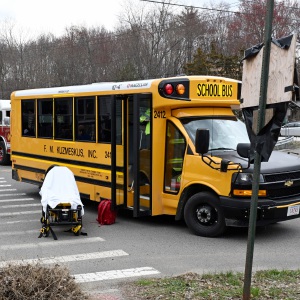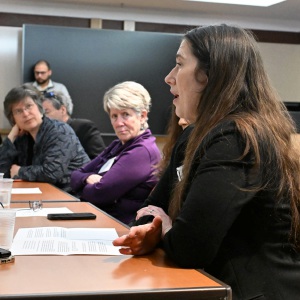Part 2: Enough Abuse shares series of tips for National Child Abuse Prevention Month

A billboard regarding child sexual abuse prevention is installed at the corner of Mill Street, Deerfield Street and Bank Row in Greenfield earlier this month. STAFF PHOTO/DOMENIC POLI
| Published: 04-11-2025 3:01 PM |
As part of National Child Abuse Prevention Month, the Greenfield Recorder is working with Enough Abuse, a citizen education and community engagement initiative organized in 2002 to prevent child sexual abuse in Massachusetts, to share a total of 20 tips for parents that will help them keep their children safe from sexual abuse. These tips are being shared over four weeks.
Waiting to have “the big conversation” with your child at 12 is too late to protect them from individuals who might sexually hurt them. Toddlers, school-age children and teens are all at risk for sexual abuse. Age-appropriate prevention messages can be woven into everyday conversations with a child as early as age 3.
■You could say: “All the parts of our bodies are good and special, and they deserve care and respect. All body parts have their own names. We can refer to them by those names without feeling embarrassed.”
■You could say, “Grown-ups and older children never, ever need help from children with their private body parts. If someone asks you for this kind of help, tell me right away, even if it’s someone in our family or someone we know. If anyone shows you their private parts, pictures of private parts or asks to take pictures of your private parts, you can tell me. If you ever feel confused about secrets, feelings or private body parts, tell me and I will help you.”
■You could say, “It’s important that you do not touch anyone else’s private parts. It could make them feel upset, confused or angry. If you are wondering about these things, come tell me and we can talk about it.”
Begin talking to your child about personal space, private parts and privacy by age 3. There are many children’s books on these topics, so reading them with your child can be a great way to begin the conversation. Visit enoughabuse.org/get-the-facts/bookshelf/#childrens-books for a list of these books.
We want children to understand that all adults should treat them with care and respect, and that if an adult does or says things that seem inappropriate or make them feel unsafe, they should tell their parent, caregiver or another trusted adult right away.
Parents must be aware that some individuals who are sexually attracted to children or teens choose to work in schools and other youth-serving or faith-based organizations. It gives them “cover” as they carefully identify children and teens they believe will be easy targets for sexual abuse. Adults in positions of authority or trust often “groom” children by engaging in boundary-violating behaviors that can lead to sexual abuse.
Article continues after...
Yesterday's Most Read Articles
 Vehicle collides with school bus causing minor injuries in Montague City
Vehicle collides with school bus causing minor injuries in Montague City
 UMass faculty calls on land grant universities to join in fight against Trump administration; McGovern, AG also weigh in
UMass faculty calls on land grant universities to join in fight against Trump administration; McGovern, AG also weigh in
 Franklin County Technical School Committee votes to oppose lottery system
Franklin County Technical School Committee votes to oppose lottery system
 Franklin County, North Quabbin groups send letter opposing pipeline expansion
Franklin County, North Quabbin groups send letter opposing pipeline expansion
 HS Roundup: Smith Academy baseball knocks off Mahar, 5-1
HS Roundup: Smith Academy baseball knocks off Mahar, 5-1
 Termination of $300K federal grant presents ‘an institutional setback’ for PVMA
Termination of $300K federal grant presents ‘an institutional setback’ for PVMA
Children and teens should know they never have to accept any behaviors from others that make them feel uncomfortable, even from adults in positions of power or who are well-liked or popular.
We will share 25 boundary-violating behaviors that parents should know about and make their children aware of. You know your children and teens and their level of development best. Explain these behaviors to them in a way they can understand and watch out for. Encourage them to tell you if they experience or see these behaviors occurring between an adult and them or another child, whether at school, in a youth-serving organization or in the community. Tell them that no matter what they share with you, you will believe them and you will not be angry with them.
Do you or your child see or know an adult in a school or youth organization that:
■Makes comments about a student’s body or physical appearance, either directly to students or to other adults in the school.
■Makes sexual comments, dirty jokes or suggestive gestures, or flirts with a student.
■Selects a student for special privileges, such as sending someone on personal errands unrelated to any educational purpose.
■Encourages students to compete with each other for “teacher’s favorite” status.
■Improves grades or test scores as a way to establish a special staff/student relationship.
Here are more of the 25 boundary-violating behaviors that parents should know about and make their children aware of. Do you or your child see or know an adult in a school or youth organization who:
■Closes or locks doors when meeting with a student or covers classroom or office windows so interactions with the student cannot be seen or interrupted.
■Gives gifts to certain students that violates school policies on giving or receiving gifts.
■Offers a student a ride in his/her car, unless in an emergency situation, or allows a student to borrow their car.
■Takes pictures of students and shares them without parental permission.
■Does things of a personal nature that students can do for themselves, such as combing their hair.
Here are more of the 25 boundary-violating behaviors that parents should know about and make their children aware of. Do you or your child know an adult that:
■Strokes a student’s hair, rubs their shoulders/back or pats their backside.
<sbull value="sbull"><text xmlns="urn:schemas-teradp-com:gn4tera"></text></sbull>Massages a student athlete during sports without another staff present.
■Showers with students after athletic practices or events, undresses around students or violates their privacy in the bathroom or changing rooms.
■Picks up a student, holds a student or lets a student sit on the staff member’s lap.
■Engages in physical contact that goes beyond a pat on the back or a high five or initiates provocative games with students such as roughhousing, horseplay, wrestling (unless in sports), tickling, etc.
Here are more of the 25 boundary-violating behaviors that parents should know about and make their children aware of. Do you or your child know an adult that:
■Follows or “friends” students on Facebook, X, Instagram, Snapchat, TikTok or other social media sites.
■Shares their personal phone number or personal email address with a student instead of using school-based phone and email systems.
■Sends private, non-school-related text messages to students or responds to text messages from students after school hours or during nighttime hours.
■Invites students to off-school events or trips or invites a student to hang out after school without other adults or students — at the school or elsewhere.
■Shares a room overnight with students when traveling for a field trip or sporting event.






 ‘Courage, not acquiescence’: McGovern encourages increased engagement during Trump administration
‘Courage, not acquiescence’: McGovern encourages increased engagement during Trump administration AG pledges to help fight opioid crisis in visit to Greenfield
AG pledges to help fight opioid crisis in visit to Greenfield Larger location for Orange Food Pantry comes in wake of increased participation, hopes for new programs
Larger location for Orange Food Pantry comes in wake of increased participation, hopes for new programs
